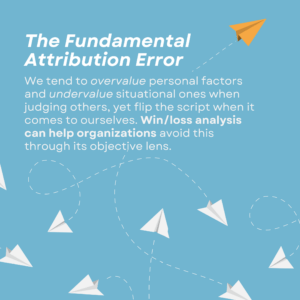
Thursday, January 18, 2024
 This blog was written by Harriet Peabody, Research Analyst at Anova.
This blog was written by Harriet Peabody, Research Analyst at Anova.
The fundamental attribution error is a cognitive bias that leads people to overestimate the influence of personal factors and underestimate the influence of situational factors on others’ behavior, while doing the opposite when assessing their own behavior. In other words, we attribute our own failures to the situation we were in rather than taking personal accountability due to our self-serving bias, while placing blame on others for their failures.
This bias can have a significant impact on our decision-making, both in our personal and professional lives. For example, if we win a big sale, we may attribute our success to our own superior skills and abilities. But if we lose a sale, we may blame the customer for being difficult or unreasonable. This attribution error prevents us from effectively learning from our losses and improving.
This is where win/loss comes in. Win/loss analysis can help organizations avoid the fundamental attribution error by providing a more objective and systematic way to evaluate performance. With voice of the customer data, organizations can read real feedback as to why they won or lost a deal. Rather than attributing wins to the sales team’s strength and losses to the unique situation they were in, organizations can identify points of strength and areas for improvement directly from the source. By carefully analyzing the factors that contributed to each win and loss, organizations can gain a better understanding of the true drivers of success and failure and can then develop a plan to replicate their successes and improve upon the factors contributing to failures.
To develop this plan, organizations need a more realistic assessment of their strengths and weaknesses. When it comes to strengths, organizations may use wins as confirmation that their team is executing well and should keep doing what they are doing. In reality, there are always areas for improvement, even in wins, and win/loss analysis helps to identify those as well as the strengths that drove the win. Even more helpful is the identification of weaknesses in lost deals. Rather than looking at the situational factors that may have contributed to a loss, a more productive process is to look at what you did have control over and could do better next time. Win/loss analysis is the best way to learn what the customer thought you could have done better, and course correct going forward, thus avoiding the fundamental attribution error.
Here at Anova, not only are we committed to helping our clients avoid the fundamental attribution error through data collection and identification of actional insights from their customers, but we are also committed to avoiding this bias within our own organization. One of our company values is ownership, something we often refer to as “less fingers, more thumbs,” meaning that instead of blaming the situation or others for any difficulty we are having, we take accountability for what we can control and take action to improve the situation. Recognizing that we do have this cognitive bias is the first step, and the next step is operationalizing a plan to counteract it. Choosing to establish a win/loss initiative at your organization is a great plan for avoiding the fundamental attributional error and therefore learning from your losses and achieving more wins.